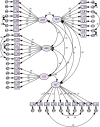Validation and psychometric properties of the Russian version of the Touch Experiences and Attitudes Questionnaire (TEAQ-37 Rus)
- PMID: 30543628
- PMCID: PMC6292699
- DOI: 10.1371/journal.pone.0206905
Validation and psychometric properties of the Russian version of the Touch Experiences and Attitudes Questionnaire (TEAQ-37 Rus)
Abstract
It has been demonstrated that nurturing and affiliative touch is essential for human emotional and physical well-being throughout our entire life. Within the last 30 years a system of low-threshold mechanosensitive C fibers innervating the hairy skin was discovered and described; this system is hypothesized to represent the neurobiological substrate for the affective and rewarding properties of touch. This discovery opens new perspectives for multidisciplinary research of the role of affiliative social touch in health and disease, and calls for establishing novel psychometric tools assessing individual differences in the domain of affective touch. The main objective of the study was to construct and validate a Russian version of the Touch Experiences and Attitudes Questionnaire (TEAQ), a self-report measure recently developed to quantify individual experience and attitude to social and affective touch. A pool of 117 items was translated into Russian and all the items were assessed for appropriateness for Russian culture (232 participants). After exploring the factor structure (468 participants), we composed a 37-item questionnaire (TEAQ-37 Rus) characterized by good reliability and a clear 5-factor structure, covering the aspects of attitude to intimate touch, attitude to friendly touch, attitude to self-care, current intimate touch experiences, and childhood touch experiences. Confirmatory factor analysis (551 participants) has demonstrated good consistency and reliability of the 5-factor structure of the TEAQ-37 Rus. Cross-validation research demonstrated moderate positive correlations between predisposition to social touch and emotional intelligence; positive correlations with extraversion and openness facets of the Big Five personality model were also found. As predicted, participants with higher TEAQ-37 Rus scores rated all observed kinds of touch as more pleasant, with a particular preference for slow touch. We anticipate that this questionnaire will be a valuable tool for researchers of social touch, touch perception abnormalities, and the importance of touch experiences for emotional and mental health.
Conflict of interest statement
The authors have declared that no competing interests exist.
Figures



Similar articles
-
Translation, validity, and reliability of the European Portuguese version of the Touch Experiences and Attitudes Questionnaire.PeerJ. 2023 Apr 3;11:e14960. doi: 10.7717/peerj.14960. eCollection 2023. PeerJ. 2023. PMID: 37033723 Free PMC article.
-
Reliability and validity of a simplified touch experiences and attitudes questionnaire for Chinese college students.PLoS One. 2024 Jan 2;19(1):e0295812. doi: 10.1371/journal.pone.0295812. eCollection 2024. PLoS One. 2024. PMID: 38166121 Free PMC article.
-
Construction and Validation of the Touch Experiences and Attitudes Questionnaire (TEAQ): A Self-report Measure to Determine Attitudes Toward and Experiences of Positive Touch.J Nonverbal Behav. 2018;42(4):379-416. doi: 10.1007/s10919-018-0281-8. Epub 2018 Aug 1. J Nonverbal Behav. 2018. PMID: 30416240 Free PMC article.
-
The Adolescent and Adult Time Inventory-Time Attitudes Scale: A Comprehensive Review and Meta-Analysis of Psychometric Studies.J Pers Assess. 2021 Sep-Oct;103(5):576-587. doi: 10.1080/00223891.2020.1818573. Epub 2020 Sep 29. J Pers Assess. 2021. PMID: 32990472 Review.
-
From Sweeping to the Caress: Similarities and Discrepancies between Human and Non-Human Primates' Pleasant Touch.Front Psychol. 2016 Sep 8;7:1371. doi: 10.3389/fpsyg.2016.01371. eCollection 2016. Front Psychol. 2016. PMID: 27660620 Free PMC article. Review.
Cited by
-
Perceived pleasantness of gentle touch in healthy individuals is related to salivary oxytocin response and EEG markers of arousal.Exp Brain Res. 2020 Oct;238(10):2257-2268. doi: 10.1007/s00221-020-05891-y. Epub 2020 Jul 27. Exp Brain Res. 2020. PMID: 32719908
-
Childhood Adversity and Affective Touch Perception: A Comparison of United Kingdom Care Leavers and Non-care Leavers.Front Psychol. 2020 Nov 10;11:557171. doi: 10.3389/fpsyg.2020.557171. eCollection 2020. Front Psychol. 2020. PMID: 33240148 Free PMC article.
-
Hold me or stroke me? Individual differences in static and dynamic affective touch.PLoS One. 2023 May 23;18(5):e0281253. doi: 10.1371/journal.pone.0281253. eCollection 2023. PLoS One. 2023. PMID: 37220110 Free PMC article.
-
To touch or to be touched? comparing appraisal of vicarious execution and reception of interpersonal touch.PLoS One. 2024 May 17;19(5):e0293164. doi: 10.1371/journal.pone.0293164. eCollection 2024. PLoS One. 2024. PMID: 38758835 Free PMC article.
-
Cortical Response Variation with Social and Non-Social Affective Touch Processing in the Glabrous and Hairy Skin of the Leg: A Pilot fMRI Study.Sensors (Basel). 2023 Sep 14;23(18):7881. doi: 10.3390/s23187881. Sensors (Basel). 2023. PMID: 37765936 Free PMC article.
References
-
- Watson JB. Psychological Care of the Infant and Child. New York: Norton; 1928.
-
- Haarer J. Die deutsche Mutter und ihr erstes Kind. München: Lehmanns; 1934. (German)
-
- Brisch Karl Heinz. Bindungsstörungen: von der Bindungstheorie zur Therapie. Stuttgart: Klett-Cotta, 2009. (German)
-
- Avdeeva NN. [Child-Parent Relationship Therapy]. Journal of Modern Foreign Psychology. 2017; 6(2): 7–14. Russian. doi: 10.17759/jmfp.2017060201 - DOI
-
- Spitz RA. Hospitalism; an Inquiry Into the Genesis of Psychiatric Conditions in Early Childhood. Psychoanalytic Study of the Child. 1945; 1: 53–74. . - PubMed
Publication types
MeSH terms
LinkOut - more resources
Full Text Sources
Research Materials

